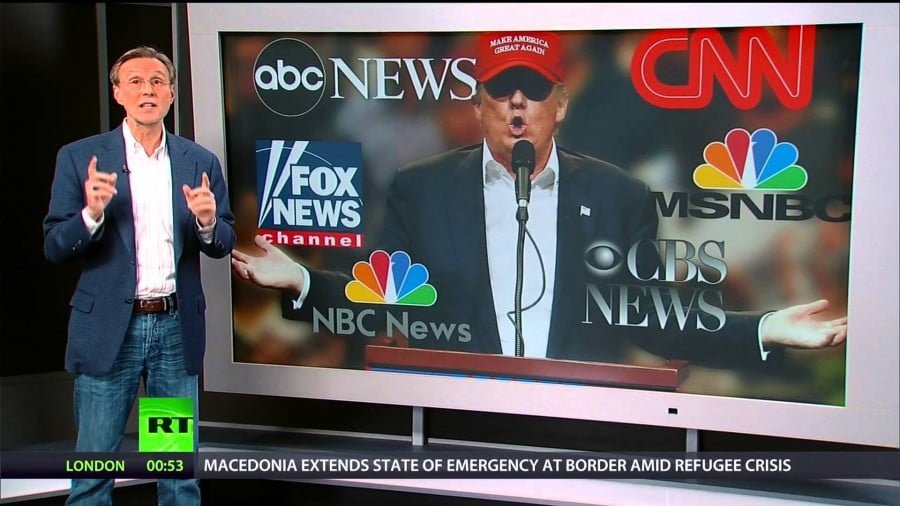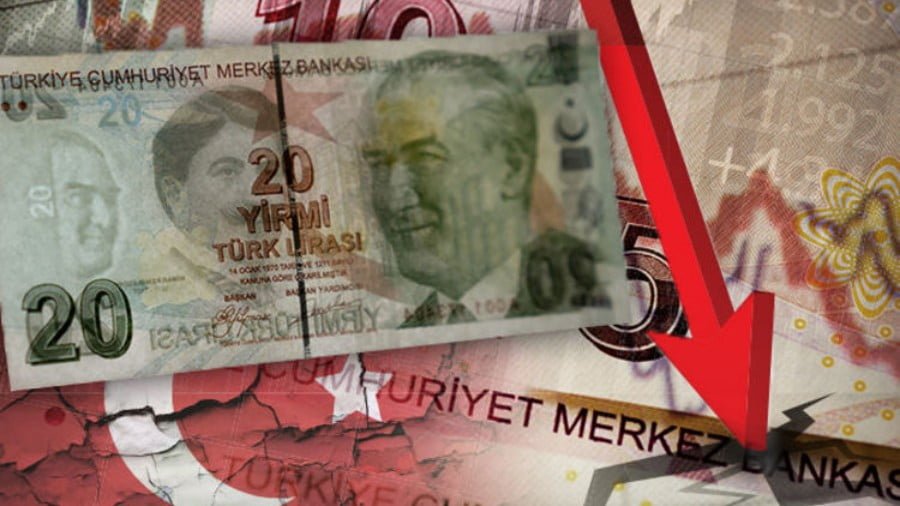Exposure to Mainstream Media: The Daily Insult
Every single day, from cradle to grave, the American population is subjected to a nonstop barrage of lies, omissions of truths and outrageous distortions, with the sole purpose of maintaining the nation’s allegiance to the imperialist/capitalist status quo anchored in constant war and unstoppable inequality. The American system of disinformation, evolved over more than a century, fools just about everyone with its apparent diversity of sources. After all the US has literally thousands of “news” outlets, from radio stations to tv stations, newspapers and other channels, and people reckon that this enormous quantity of media must automatically guarantee a vigorous debate of the issues at hand and the presentation of all viewpoints. They could not be more wrong. This diversity is an illusion.
THE BIG MEDIA HOAX
What the American media offer is not a well-informed diversity of views by a long shot, but brute quantity, “numerosity”, and a tedious and dangerous repetition of the same official viewpoint, always designed to bolster the status quo. To aggravate matters, the American media are well known for their tendency to travel in packs, the trademark of groupthink, and, at any moment to carpet bomb the American mind with any propaganda line, no matter how silly, outrageous and lacking in evidence, ordered by their wealthy owners or hidden intelligence and military agency controllers. The current unrelenting Russiagate campaign and hysterical demonisation of any enemy of Washington’s global supremacist project, is a case in point. It is but the latest of numerous efforts to control the national and global narrative regardless of costs to the general population at home or billions of people outside America’s frontiers.
The above sounds like a complete rejection of what the mainstream media would like us to think about their role and performance, but our brief is irrefutable. What matters most in the marketplace of ideas (which is really the marketplace of political ideologies), is that in a deeply class-divided society such as the United States, with uber billionaires on one side and ordinary citizens and paupers on the other, each class viewpoint should at least be fairly represented. (I realise this is in itself a contradiction between civics 101 and reality: if good democratic representation existed, such inequality and grotesque abuses would not likely exist). In the US—as it so clearly also happens with the political system promising but not delivering voter influence on policy decisions—the media deliberately fail their proper role. In that sense we see an inevitable parallelism: both the political system and the media fail because neither is really interested in serving the people.
Why do people in this supposedly free society tolerate such an obviously flawed state of affairs? Ironically, when we examine this problem at a deeper level, part of the the illusion of free media and diversity is supported in the US by reference to what the US is supposedly not: a totalitarian system. A century-old anticommunist campaign depicting Russia, China and other non-capitalist societies as the summation of everything evil and undesirable includes the idea that it is state control of the media that defines a non-democratic society. Yet, as history shows, this is not only superficial but false. State control of media is not, per se, sufficient to determine the degree of “democracy” existing in a polity, if by “democracy” we mean, inter alia, equality before the law, diffusion of power, and non-autocratic rule. The “good society” —if we are to follow the multiparty capitalist democracy model—is rarely achieved through this arrangement, and often quite the opposite, as the case of America, the most vociferous nation proclaiming its excellence in democracy, abundantly shows. A nation riddled with grave social injustice, pervasive economic insecurity, grotesque inequality, and a cancerous and criminal militarism cannot issue from a healthy political system, no matter what anyone chooses to call it.
In fact, we are being rhetorical. We know what the reality is: the US is no longer, if it ever was, an authentic democracy. What we do have today is an oligarchy deeply embedded, like a parasite (most of the time) in the US—which serves as their world class headquarters— managing a highly oppressive and exploitative global empire. This is no longer the opinion of media-ghettoised radicals, but the sober judgment of two Ivy League academics:
A new study from Princeton spells bad news for American democracy—namely, that it no longer exists.
Asking “[w]ho really rules?” researchers Martin Gilens and Benjamin I. Page argue that over the past few decades America’s political system has slowly transformed from a democracy into an oligarchy, where wealthy elites wield most power.
Using data drawn from over 1,800 different policy initiatives from 1981 to 2002, the two conclude that rich, well-connected individuals on the political scene now steer the direction of the country, regardless of or even against the will of the majority of voters.
“The central point that emerges from our research is that economic elites and organized groups representing business interests have substantial independent impacts on U.S. government policy,” they write, “while mass-based interest groups and average citizens have little or no independent influence.” (Princeton Study: U.S. No Longer An Actual Democracy, Talking Points memo, 4.18.2014)
Actually, shocking as the study may be to those for whom US exceptionalism is an unquestionable dogma, Gilens and Page are too coy in their diagnosis, and too narrow on the data platform they chose to draw their conclusions. The US lack of authentic and vigorous democracy extends way back, almost to its inception (and many would argue, with plenty of reason, to its very foundation, as the new nation was designed as an aristocratic republic in the style of old Athens or Rome, and not an effective, inclusive democracy). Probably in an effort to avoid too much career-injuring controversy, Gilens and Page also refused to name capitalism as the inevitable source of such democratic evisceration.
But labels, while helpful, can also obfuscate. At the end of the day, the main thing to decide whether or not we live in a good society is the policies themselves. The old cui bono DNA of any government. Who do these laws benefit? Who makes these laws? Who implements them? What mechanism exists to reshape laws when necessary?
Returning to our initial question, are all single-party countries where the media are state-controlled “undemocratic” by definition, the answer is no. By their fruits you shalt know them. As Cuba, China and other nations have proved, the question reflects a capitalist way of looking at things, not a democratic view, per se. For in a true democracy we can easily envision all banks as public or cooperative institutions, if the popular will so desires. And the same can happen to the media. The notion that government automatically pollutes the media and that private control insures its virtue is false. For to properly answer that question we must ask another: how much of the well-informed, popular will is invested in that government? And yet another: how democratic do you think the average corporation or run-of-the-mill billionaire is? Chomsky said that corporations are hierarchic tyrannies, and we’re cool with that. It’s a practical and economical definition, even if this sector of society has spent and continues to spend tons of money on advertising and p.r. to convince people that it is the consumer who ultimately has all the power.
Thus the perception that the US is a democracy and that its media is “free” and “vigorous” and “diverse” because they are privately owned, hence not “state” or “government-controlled”, the telltale sign of dreaded totalitarianism, is a serious misperception. For in a system of deeply integrated corporate fascism with a “friendly consumerist” face, as the US has developed, the distinction between the corporate line and the state line is virtually non-existent.
Understanding media is essential to your liberation
The Greanville Post publishes a large number of articles dedicated to highlighting the manner in which reality is distorted for the sake of corporate and imperialist advantage (imperialism, for simplicity’s sake, merely being the global corporate system’s foreign policy). A whole section of this site—Media Front—is dedicated to archiving media—related essays. Day after day, media distortions have enormous and painful repercussions, at the personal and social level, and also at the vital ecological level, always blocking urgent remedial action while facilitating further assault in the form of increasing exploitation of human labour and nature, and the waging of endless and ever more dangerous genocidal wars. The Big Lie, energised in our time by a sophisticated apparatus of global communications in which false flags are routinely reported as truth, serves as both shield and legitimator for a criminally dysfunctional system in which decent and rational policy is all but eliminated.
But corporate propaganda is not just a question of scandalous lies. The best approach to mind manipulation is simply the systematic omission of truth, and that can be accomplished almost without a trace by eliminating truly critical voices from the mainstream debate. Or by filtering out at the hiring point journalists with solid education, firm moral principles, and inquiring minds. Jason Hirthler, one of the most astute observers of the media degeneracy in the Anglophone world, and in general throughout the capitalist world, has summed it up beautifully. Speaking of fake news and the CIA’s vast infiltration of newsrooms, he noted acidly that,
Here American media rooms generally need not be ‘infiltrated’, not that this hasn’t been relentlessly done (then buried). Yet the effect of decades of fake news promoting American exceptionalism and excessively demonizing all non-capitalists has produced several generations of robotic groupthinkers that have internalized the values of power. Rarely must such journalists even be instructed what to say; they already know what to say; they already know how to balance a story, how to under-report, how to deprioritize, how to frame, how to produce dead ends, how to terminate a train of thought, and how to remove responsibility from active agents using the passive tense. The techniques are myriad. Modern newsrooms are full of such obsequious zombies. (see J. Hirthler, Condemned to Repeat It: History as Rerun,).
The above is not as hyperbolic as it sounds.







